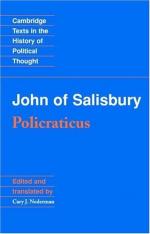|
This section contains 378 words (approx. 2 pages at 300 words per page) |
Encyclopedia of World Biography on John of Salisbury
The English bishop and humanist John of Salisbury (ca. 1115-1180) is generally considered to have been the most cultured man of his day. He associated with great scholars, rulers, and churchmen, and his writings testify to the wide scope of his interests.
John was born in Old Sarum near Salisbury. In 1136 he began a career as student and then scholar in the schools of Paris (where he studied with Peter Abelard) and Chartres, then the center of humanistic studies of the arts and of the Latin classics. He became proficient in rhetoric, literary analysis, logic, and law, both ecclesiastical and Roman.
In 1148 John probably entered the service of Theobald, Archbishop of Canterbury, where he remained until 1150, when he went to Rome to assume a post of uncertain nature in the Papal Curia. From 1153 or 1154 he was again at Canterbury, as Theobald's private secretary. In 1159 John completed his first major work, Policraticus, or Statesman's Book. Policraticus was the first medieval study of the state and the prince; John's analyses of the conduct of good and bad princes testify to his understanding of the new power attained by centralized authority in the 12th century, thanks to the end of the Viking invasions and the development of stable feudal relationships.
The Metalogicon, written shortly after Policraticus, is a work of educational theory, assessing the role of the arts and defending them against narrow-minded critics. John utilized in Metalogicon the newly discovered works of Aristotle, which would dominate education in the following century.
About this time (1162), Thomas Becket, whom John had befriended while Becket was still chancellor of England, succeeded Theobald as archbishop. John sided with Becket in his controversy with Henry II of England and in 1164 went into voluntary exile because of his views. Early in 1170 he returned to England and was present at Becket's martyrdom on December 29. While in exile, he had written the Historia pontificalis (probably begun in 1164; Papal History), an unfinished but fascinating account of the papal court during the years 1148-1152.
John remained at Canterbury, at work on an unfinished biography of Becket, until 1176, when he was elected bishop of Chartres, an office he held until his death on Oct. 25, 1180. Charitable, honest, and reasonable, he appears in all his works as a model Christian humanist.
|
This section contains 378 words (approx. 2 pages at 300 words per page) |


